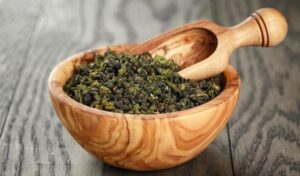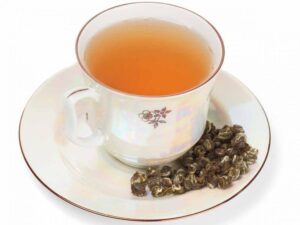The Truth About oolong tea caffeine
I. Introduction
Tea has been a beloved beverage for centuries, and one type that has gained popularity in recent years is oolong tea. This unique tea is known for its complex and delicate flavors, as well as its potential health benefits. But one question that often comes up when discussing oolong tea is its caffeine content. In this blog, we will dive into the truth about caffeine in oolong tea and debunk some common myths surrounding it.
A. Explanation of Oolong Tea
Oolong tea is a traditional Chinese tea made from the leaves of the Camellia sinensis plant. What sets it apart from other types of tea is the level of oxidation during processing – oolong tea falls in between green and black tea, giving it a distinct flavor profile. It is also known for its rich antioxidant properties and potential health benefits.
B. History and Origin of Oolong Tea
The history of oolong tea dates back to ancient China, where it was first produced in Fujian province. Legend has it that a tea farmer was so engrossed in his job that he failed to notice the leaves oxidizing, resulting in a unique flavor that became known as oolong (or “black dragon” in Chinese). Today, oolong tea is still mainly produced in China and Taiwan, but its popularity has spread all over the world.
C. Brief Overview of Caffeine in Tea
Caffeine is a natural stimulant found in many plants, including the Camellia sinensis plant. It is commonly associated with coffee, but it is also present in varying levels in different types of tea. Caffeine can have both positive and negative effects on the body, which we will discuss further in this blog.

read also:Why Dignity Health is the Best Place to Start Your Career
II. What is Caffeine?
A. Definition of Caffeine
Caffeine is a natural compound found in plants, seeds, and fruits. It is a central nervous system stimulant that can increase alertness and energy levels.
B. How Caffeine Affects the Body
When consumed, caffeine binds to adenosine receptors in the brain, blocking the effects of adenosine – a neurotransmitter responsible for promoting relaxation and sleep. This results in a feeling of increased alertness and energy. Caffeine also stimulates the release of adrenaline, providing a short burst of energy.
C. Recommended Daily Intake of Caffeine
The Food and Drug Administration (FDA) recommends an intake of no more than 400 mg of caffeine per day for healthy adults. This is equivalent to 1-2 cups of coffee or 4-5 cups of oolong tea. However, caffeine sensitivity varies from person to person, so it is essential to listen to your body and not exceed your own limit.
III. Caffeine Content in Oolong Tea
A. Factors Affecting Caffeine Levels in Oolong Tea
The caffeine levels in oolong tea can vary depending on several factors:
1. Oxidation Level: As mentioned earlier, oolong tea falls between green and black tea in terms of oxidation. The more oxidized the leaves are, the lower the caffeine content.
2. Brewing Time and Temperature: The longer you steep your oolong tea and the hotter the water temperature, the more caffeine will be extracted.
3. Quality and Type of Leaves: Oolong tea can be made from different varieties of the Camellia sinensis plant, and some may naturally have higher caffeine levels than others.
B. Comparison of Caffeine Levels in Oolong Tea with Other Types of Tea
In general, oolong tea contains less caffeine than black tea but more than green or white tea. A cup of oolong tea typically contains around 30-50 mg of caffeine, while black tea can have up to 90 mg per cup. However, these levels can vary based on the factors mentioned above.
C. How to Determine the Caffeine Content in Oolong Tea
If you are concerned about the caffeine levels in your oolong tea, there are a few ways to determine its content. You can check the type of leaves used, the steeping time and temperature, or use caffeine testing strips specifically made for tea.
IV. Effects of Caffeine in Oolong Tea
A. Positive Effects of Caffeine in Oolong Tea
The Truth About oolong tea caffeine :Moderate consumption of caffeine in oolong tea can have several beneficial effects on the body, including:
1. Boosts Energy and Alertness: As a stimulant, caffeine can improve mental and physical energy levels, making you feel more alert and focused.
2. Improves Mental Focus and Concentration: Caffeine has been shown to enhance cognitive function, improving memory, reaction time, and concentration.
3. Aids in Weight Loss and Metabolism: Caffeine has been found to boost metabolism and aid in weight loss when combined with a healthy diet and exercise.
B. Negative Effects of Caffeine in Oolong Tea|The Truth About oolong tea caffeine
Excessive consumption of caffeine can also have negative effects on the body, including:
1. Jitters and Anxiety: Too much caffeine can lead to jitters, restlessness, and anxiety.
2. Disrupts Sleep Patterns: Consuming caffeine too close to bedtime can disrupt your sleep patterns and make it difficult to fall asleep.
3. Dehydration and Other Health Concerns: Caffeine is a diuretic, meaning it can cause dehydration if consumed in large amounts. It may also exacerbate existing health conditions such as high blood pressure or heart problems.
V. Myth vs Reality: Oolong Tea and Caffeine

A. Common Misconceptions about Oolong Tea and Caffeine
There are several myths surrounding oolong tea and caffeine that may cause confusion or misinformation.
B. Clarifying the Truth Behind These Myths
The Truth About oolong tea caffeine 1. Oolong Tea is Decaffeinated – True or False?
False. Oolong tea is not entirely decaffeinated, but it does have lower caffeine levels compared to black tea.
2. Oolong Tea is Lower in Caffeine Than Other Types of Tea – True or False?
True and False. While oolong tea generally has lower caffeine levels than black tea, it can still vary based on factors such as oxidation level and brewing methods.
3. Oolong Tea is Healthier Than Coffee – True or False?
False. While oolong tea may have several health benefits, it is not inherently healthier than coffee as it still contains caffeine. The key is to consume both in moderation and listen to your body’s reactions.
read aslo:Understanding Sperm Cramps: Causes, Symptoms, and How to Relieve Them
VI. Tips for Managing Caffeine Intake from Oolong Tea
A. Understanding Your Caffeine Sensitivity
Everyone’s tolerance for caffeine is different, so it is essential to pay attention to your body’s reactions and adjust your intake accordingly.
B. Limiting Your Intake of Oolong Tea Based on Caffeine Levels
If you are sensitive to caffeine, you can try opting for low-caffeine oolong teas, such as lightly oxidized varieties or shorter brewing times.
C. Final Thoughts
Oolong tea is a delicious and healthy beverage that can provide various health benefits. However, it does contain caffeine, so it is essential to consume it